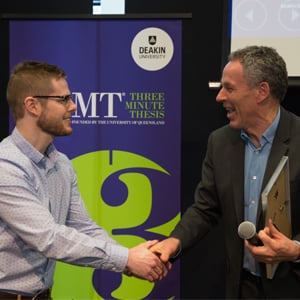Digital games can educate, claims 3MT winner
Research news
A presentation on the educational value of digital games has seen PhD student Jarrod Hogan win this year’s Deakin 3MT crown.
Mr Hogan is investigating whether the strategic use of digital games in secondary school classrooms could be a powerful educational tool.
Based within Deakin University's School of Education, Mr Hogan received both Deakin’s 3MT and People’s Choice awards at the recent 2018 competition, held on the Waurn Ponds campus.
This year’s 10 finalists represented a variety of Deakin research as they battled it out to deliver their projects in only three minutes. Topics ranged from how taxation can be used as a social-engineering tool, to the development of sustainable agriculture in urban areas.
Ms Pamela Rufus from the Faculty of Health was named runner-up for her presentation on creating better bone fracture predictions for Australians. Under her supervisor Professor Julie Pasco, Ms Rufus is evaluating an innovative, cheap, quick and portable device titled the OsteoProbe, which measures how well a bone resists micro-indentation. While the device is currently only available for research use, it holds great promise for use in clinical practice to assess fracture risk.
A former teacher, Mr Hogan is passionate about engaging and empowering students to control their own learning. His research will focus on addressing the knowledge gap as to how games can aid secondary students’ learning.
“I really think that what I’m doing is important, so it was nice to have the opportunity to communicate a succinct message to people about my research,” he said.
“When I was a teacher one of the things I noticed was that even though students have so much stake in their education, they have very little say in the decisions that are made in the classroom.”
“There are a lot of previous studies that tend to focus on primary levels, but secondary students haven’t really been engaged with research on this topic. Part of the reason why I wanted to do this research was to give these students a voice. I want to actually engage their thinking, ideas and perspectives on how they can learn with games.”
Mr Hogan says games often give players choices about how they approach and solve problems.
“In a classroom environment this is particularly important as it can help give students agency and the opportunity to learn in a style that suits their strengths.”
“Games also lower the consequences for failure, which encourages students to try new things and to take risks with their learning.”
Mr Hogan said research has always been a passion of his and he always considered pursuing the academic pathway.
“While I decided to do teaching first, research was something that was always in the back of my mind. I thought I could potentially have a different, but important impact in another way through research.”
He noted that the 3MT is a great example of research becoming more broadly accessible.
“It’s great that the public, the Faculties and the University can come together and share an array of knowledge with one another,” he said.
Mr Hogan’s supervisor for this project is Professor Catherine Beavis. Mr Hogan will now represent Deakin in the 3MT Asia-Pacific finals in Queensland on September 27, with the opportunity to win a $5000 research travel grant.
This year’s judges were Professor Gary Smith, Deputy Vice-Chancellor Global Engagement; Professor Chris Hickey, Chair of the Academic Board; Professor Joe Graffam, Deputy Vice-Chancellor Research; and Professor Tiffany Walsh, Professor of Bionanotechnology at the Institute for Frontier Materials.
Share this story

Key Fact
Deputy Vice-Chancellor Global Engagement Professor Gary Smith (right) presents Deakin’s 3MT winner, Jarrod Hogan with his award.
